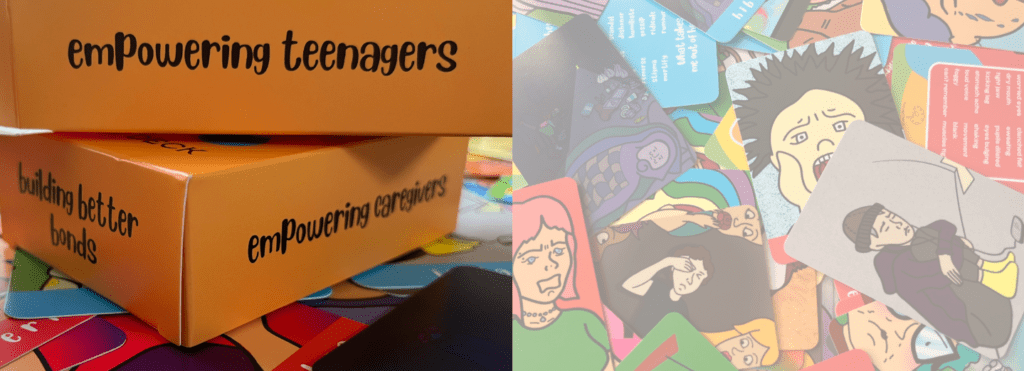Navigating the Emotional Rollercoaster of Adolescence is a blog post for stressed out parents and caregivers. It can be hard to keep up with the ever-changing emotions of our adolescents, especially when they are dealing with adolescent mental health issues such as anger issues or feeling angry. Becoming more “Polyvagal Aware” can help you better understand why your troubled teen may be feeling so overwhelmed and how you can help them navigate these tumultuous times.
By helping your teenager become more aware of linking their emotions to their behaviors and recognise the sensations in their body, they will be better equipped to recognize when they are feeling angry, as well as other emotions like fear or sadness that may be underlying their teenage anger. This awareness can lead to healthier coping strategies and ultimately help them feel calmer in the face of difficult situations.
Adolescence is a time of rapid physical, mental and emotional growth and development. This means that adolescents are often overwhelmed by their own emotions as they try to make sense of them. They may feel like they are on an emotional rollercoaster, with their feelings changing quickly and without warning. As parents and caregivers, it can be difficult to know how best to support them during this time.
The Polyvagal Theory provides us with a framework for understanding the autonomic nervous system’s role in regulating emotions and behavior. It helps us recognize when our adolescent is feeling safe or threatened, so we can respond appropriately. Becoming more “Polyvagal Aware” allows us to better understand our adolescent’s emotional state and provide or seek the support they need in order to feel safe and secure.
This blog will provide parents and caregivers with an understanding of teenage anger and aggression. We will explore the brain structures responsible for these emotions, as well as how to help teens manage their feelings of frustration and anger. Most teens are not aware of the impact their emotions have on their mental health, so it is crucial that we provide them with the tools to help them recognise what their nervous system is trying to say to them and strategies for calm.
Raising adolescents can be a difficult task for any parent. It is important to remember that as a parent, you are not in control of your teenager’s behavior and decisions. You can only provide guidance and support. It is important to separate what is in your control from what is out of your control when parenting teenagers.
In terms of what you can control, it is important to set clear boundaries and expectations for your teenager. This will help them understand the limits of their behavior and help them make better decisions. Additionally, it is important to maintain an open line of communication with your teen so that they feel comfortable talking about their feelings and experiences with you.
On the other hand, certain things are out of your control as a parent. For example, you cannot force your teen to make good decisions or behave in a certain way – this must come from within them. Additionally, it is important to remember that teenagers are still developing and growing into adults, so they may make mistakes along the way – this should be expected and accepted by parents.
When it comes to dealing with teen’s anger, it is important to stay calm and provide a safe space for them to express their feelings. It is also important to recognise the warning signs of anger and be aware of your own emotional response. Troubled teens may sometimes lose control of their emotions, so it is important for parents to be patient and understanding while helping them find ways to cope with their angry feelings.
During the turbulent teen years, it can be frightening to see that your angry teenager or you may be losing control. This can look like aggression, violence, or disruptive behavior when trying to cope with everyday situations or overwhelm and meltdowns. The good news is, there are many tools and strategies available to help parents and teens deal with anger outbursts.
Utilising positive body language and practicing techniques such as deep breathing and mindfulness can help keep situations from escalating and maintain emotional control during tense moments. Recognising when things have gotten out of hand or heading that way and finding healthy ways in expressing anger is key to preventing disputes from getting worse. With the right support, parents can help their teenagers effectively manage their emotions in a healthy way.
Overall, it is essential for parents of teenagers to understand the difference between what they can control and what they cannot when raising adolescents. We know “letting go” – many parents find it difficult – simply because it is difficult! One day you are changing nappies ….. then suddenly they don’t want you around. But by you setting clear boundaries and expectations while also maintaining an open line of communication with their teen, parents can ensure that their relationship with their teenager remains healthy and strong throughout adolescence.
It is important to be your child’s emotional coach as you will help them learn how to manage their anger and develop healthy coping skills. An emotional coach is someone who helps a child understand, express, and manage their emotions – in a healthy way. This involves recognizing the emotion, helping the child label it, and then providing guidance on how to deal with it.
As a parent, you can provide this support by listening to your teen’s anger without judgment and helping them find ways to express anger in a positive way. When children can understand and communicate their emotions in a healthy way, they are better equipped to handle difficult situations.
This can help them avoid angry outbursts or hostile behavior, which can lead to long-term mental health issues such as depression or anxiety or mental health diagnosis from the DSM-5 Additionally, being an emotional coach for your child can help build self-esteem and impulse control for your whole family.

Adolescence is a period of rapid physical and emotional changes, and it’s not uncommon for teenagers to experience mood swings as they go through puberty. Hormonal changes during this time can affect their moods, making them more prone to feeling angry or having low impulse control. It’s important for parents to understand the underlying causes of these feelings and how to help their children deal with them.
Research has shown that during adolescence, the brain undergoes a process called “brain pruning”. This process of synaptic pruning is an important part of normal brain development, as it allows the brain to become more efficient and better able to handle complex tasks.
Synaptic pruning begins in early childhood and continues through the teenage years. During this time, weaker synapses are removed while stronger synapses remain, allowing the brain to become more efficient and better able to handle complex tasks. Pruning also helps create new neural pathways that can be used for higher-level thinking. Synaptic pruning is essential for healthy brain development during adolescence, as it allows the brain to become more efficient and better able to handle complex tasks. Without this process, adolescents would not be able to think as critically or solve problems as effectively as they do now. We must understand how synaptic pruning works so that we can better support adolescents during this critical stage of their development.
This process can cause teenagers to feel overwhelmed by intense emotions like anger, which can lead to issues with expressing those feelings in healthy ways. Additionally, studies have found that when adolescents experience anger, it tends to last only a few seconds before they move on to something else – meaning that it’s important for parents to be patient (we know its easier said than done) and understanding when dealing with their child’s emotional outbursts.
Mental health is an important factor in helping teenagers cope with their changing hormones and mood swings. Parents need to be in a place where they can provide support and guidance during this time so that their children can learn how to express their emotions in healthy ways. Additionally, research suggests that providing teens with positive outlets such as sports or creative activities can help them manage their feelings of anger or frustration in productive ways.
Overall, hormonal changes during adolescence can cause teenage mood swings that may seem overwhelming at times. However, understanding the underlying causes of these feelings and providing compassionate support and guidance can help teenagers learn how to manage their emotions in healthy ways.
Parents of teenagers can often struggle to find ways to help their teens manage their intense emotions, especially anger. It can be difficult for parents to know how to respond when their teenager is feeling angry, and it’s important for parents to understand the underlying causes of teenage anger. One way that parents can help their teen manage their emotions is by becoming polyvagal aware. Polyvagal awareness is a concept based on Stephen Porges’ Polyvagal Theory which states that the autonomic nervous system plays an important role in regulating emotion. Here are five top tips for parents looking to teach their teenagers how to manage their teenage emotions:
Getting off the emotional roller coaster with your teenager requires patience and understanding from both sides to start with aswell as finding helpful tools and strategies.
By recognizing that teens are still learning how to manage their emotions, parents can take steps towards helping them find healthier ways of expressing themselves. With support and guidance, teens can learn how to navigate this difficult period of life without feeling overwhelmed by strong emotions or resorting to aggression or other destructive behaviors.
Talking therapy can be helpful in teaching teens how to express their emotions in a healthy way. Creative therapies like art or music can also help young people learn how to manage their emotions better. Additionally, understanding the role of the brain in emotional responses can help parents better understand why their teen may be feeling overwhelmed by strong emotions.
Understanding polyvagal theory can make a big difference. Polyvagal theory is based on the concept that our autonomic nervous system plays a large role in how we respond to stressful situations and emotions. It explains how our body reacts when we’re feeling overwhelmed and offers strategies for calming down and managing difficult emotions more effectively.
Learning polyvagal theory can help parents understand why their teen may be feeling overwhelmed or reacting with anger. It can also provide them with insight into the underlying cause of their teen’s behavior and why certain strategies may not be as effective in addressing it. By recognizing that teens are still developing emotionally, parents can take steps towards helping them find healthier ways of expressing themselves by using polyvagal-based tools such as breathing exercises or journaling. Additionally, understanding the role that our brain plays in emotional responses can help parents better understand why their teen may be feeling overwhelmed by strong emotions and how best to support them during this challenging time in their life.
By taking the time to learn about polyvagal theory and its application to teenage emotion regulation, parents can feel more confident in guiding their teens through the emotional rollercoaster of adolescence. This understanding will provide them with the tools they need to get off the emotional roller coaster with their angry teen and help them find healthier ways of expressing themselves.
The Polyvagal Teen Card Deck is a great resource for parents and caregivers looking to help their teens navigate the emotional rollercoaster of adolescence. This set of 80 colourful therapy cards provides an easy-to-understand introduction to Dr. Stephen Porges’s polyvagal theory, which is a framework for understanding how our autonomic nervous system regulates our emotions. The cards are designed to help young people, parents, and caregivers get to know their own emotions better, as well as those of their children.
The card deck simplifies polyvagal theory in an accessible way that teenagers can relate to. It includes 40 unique image cards that help clients explore feelings and become aware of autonomic reactions. The cards also provide access to online practices for calming down and making positive changes in the face of difficult emotions. These practices range from simple breathing exercises to more complex activities such as journaling or creating art projects.
The Polyvagal Teen Card Deck is a great tool for helping young people manage their emotions – including those strong emotions such as intense anger, rage, and teenage aggression during this challenging time in their lives. It provides an easy-to-understand introduction to polyvagal theory and managing difficult emotions, whilst helping parents connect with their children and build stronger relationships.
With this card deck, parents can feel more confident in guiding their teens through the emotional rollercoaster of adolescence.

Adolescence is a time of great change and growth, but it can also be an emotional rollercoaster. Teens often experience strong emotions whilst they try to work out their own identity and form relationships. Emotions such as anger can lead to serious problems if not managed properly. Sometimes they may have a lot to be angry about. Parents and caregivers need to understand the physical, cognitive, and social changes that adolescents experience to best support them during this time.
Parents should be aware of the signs of teenage anger and how to help their children express their feelings in a healthy way. Teaching teens about anger management techniques can help them learn how to deal with their emotions constructively. Additionally, providing resources such as counseling or therapy can help teens learn how to manage their emotional responses in a safe environment. And remember parents – we are our children’s role models!
With the right support and guidance, tools, and resources, however, teens and parents can develop the skills they need to navigate these turbulent waters. Ultimately, adolescence is a unique and exciting stage of life that should be embraced with open arms!
https://www.frontiersin.org/articles/10.3389/fnint.2022.871227/full
https://www.ncbi.nlm.nih.gov/pmc/articles/PMC1868418/
https://drarielleschwartz.com/children-emotional-regulation-polyvagal-theory-dr-arielle-schwartz/
https://togetherthevoice.org/wp-content/uploads/2020/02/Creating-Excellent-Organizations-Handouts
https://www2.ed.gov/parents/academic/help/adolescence/adolescence.pdf

With a passion for improving the emotional wellbeing of young people, adults and parents, she is the founder and creator of Polyvagal Teen®, she has developed an innovative approach to helping teens recognise and manage stress and anxiety through becoming “Polyvagal Aware”. In addition, Yasmin is also the founder of World Let’s Stop Shouting Day, which aims to promote peaceful communication and reduce conflict and aggression in our daily interactions. Neurosloth™ and The Hearts Whisper®
She also runs a small private practice providing counselling and neurofeedback to young people and adults in North Yorkshire.
